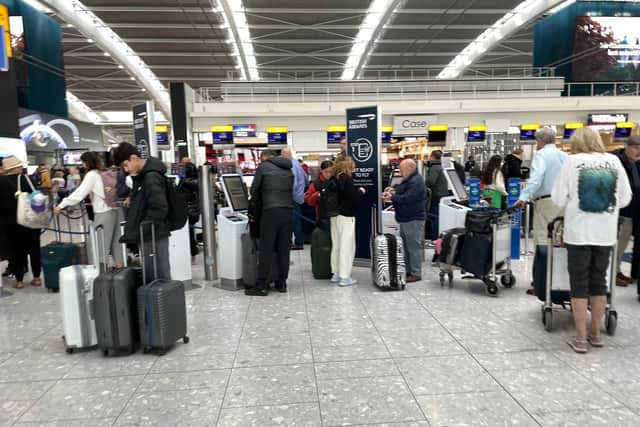Easing of airport security liquid rules delayed by a year
and live on Freeview channel 276
The Government announced it has granted extensions to several large UK airports unable to meet its June 1 deadline to fully install new scanning technology.
The new scanners produce more detailed images, meaning passengers can be allowed to pass through airport security with containers holding up to two litres of liquid in their hand luggage.
Advertisement
Hide AdAdvertisement
Hide AdAt airports which have not put them in place, the limit remains 100ml and containers must be put in clear plastic bags.


The new scanners also end the need for laptops and tablets to be removed from hand luggage.
A deadline of December 2022 for most major airports to deploy new scanners was initially set in August 2019 by then-prime minister Boris Johnson.
After the aviation industry suffered huge disruption due to coronavirus travel restrictions, in December 2022, Transport Secretary Mark Harper set a new date of June 1 2024.
He said at the time this would reduce queuing times.
Advertisement
Hide AdAdvertisement
Hide AdMany airports are struggling to install the scanners ahead of the busy summer holiday period, largely due to supply chain delays and construction difficulties caused by the weight of the machines.
Ministers have issued extensions of up to 12 months to several airports on a case by case basis, which is expected to be enough time for them all to complete the work.
The Government is also exploring how financial penalties could be imposed for further non-compliance.
The Department for Transport refused to provide a breakdown of the situation for each airport, citing security concerns.
Advertisement
Hide AdAdvertisement
Hide AdIt said by the start of June about half of passengers flying from UK airports will be processed by the new scanners.
But passengers are advised to prepare to follow the existing rules, and check with their airport for any changes.
Mr Harper said: "These cutting-edge scanners will make air travel safer and easier for passengers by strengthening security even further.
"The UK is leading the world with its rollout of this technology, but it's important we give those airports yet to meet the deadline a second chance to get the job done.
Advertisement
Hide AdAdvertisement
Hide Ad"Until they do, passengers should continue to check before travelling."
Heathrow has previously said it expects to have new scanners in all security lanes this summer, while Gatwick expects to complete the programme by the end of March next year.
Manchester Airports Group, which runs Manchester, East Midlands and Stansted airports, said its scanners will be fully rolled out in 2025.
London City become the UK's first major airport to begin using the new scanners for all passengers in April last year.
Advertisement
Hide AdAdvertisement
Hide AdKaren Dee, chief executive of trade body the Airport Operators Association, said: "Airports are making excellent progress in delivering these multi-million-pound investment programmes, which will ensure the UK remains at the forefront of aviation security in the years ahead.
"As with any programme of this complexity, there are significant challenges, and we are happy the Government has recognised these and agreed to extend timeframes for delivery where necessary.
"By adopting this approach, airports can ensure that they are ready to welcome passengers over the upcoming holiday periods and that their journeys are safe, secure and smooth as we make this transition."
Airport security restrictions for liquids were introduced in 2006 following a foiled terror plot to blow up planes flying from London to the US with homemade liquid bombs.
Travellers failing to adhere to them is one of the biggest causes of delays at airport security checks.